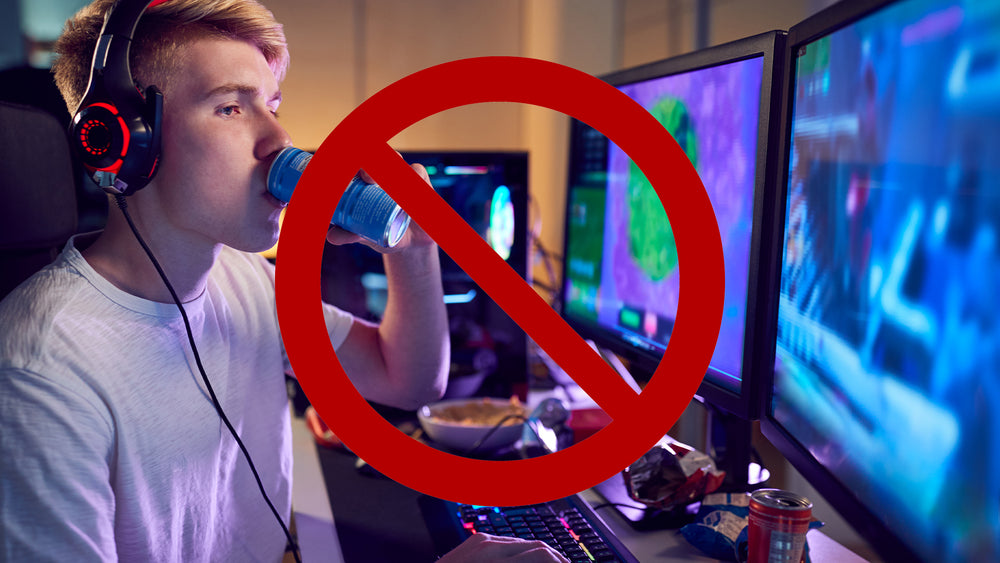When TVs became a staple in American homes in the 1950s, parents warned their children “Don't sit so close to the TV. You'll ruin your eyes”. Years later, most kids still had decent eyesight despite regular TV watching. When any new, innovative product alters society, there are inevitable questions about how it will affect our daily routines, jobs and social lives. Smartphones, laptops, tablets and other electronic gadgets have not only changed our lives, they've caused doctors and researchers to focus on the long-term health effects of daily usage.
Buy Happy Girl Mood Enhancing Supplement to Feel Better Naturally
HAPPY GIRL helps you to feel calmer, more energetic, and promotes an overall feeling of well-being.
Cell Phone Radiation Facts
The International Agency for Research on Cancer (IRIC) non-ionising electromagnetic radiation. emitted from cell phones and Wi-Fi as possible carcinogens. A study exposed rats to the same level of radiation a heavy Smartphone user experiences during a lifetime, and the results showed the rats developed rare types of brain and heart cancer. Male rats were more likely to get cancer than female rats, and heart cancer was more prevalent than brain cancer.
What implications does this study have for humans? It shows there is some elevated risk of cancer for heavy cell phone users. Today's cell phones emit lower power levels and are less damaging to health than earlier models, and many manufacturers take health concerns into account when developing new phones.
Another study shows an increase in glucose metabolism in the brain after a 50 minute phone call, but the health consequences of this activity is unknown.
You can protect yourself against high-levels of cell phone radiation by taking the following steps:
- Use a hands-free device or speaker phone, and keep the phone away from your body.
- Keep your phone charged. The lower the percentage of power remaining on your phone, the higher the radioactive frequency.
- Use a Smartphone with a low radiation level. The FCC recommends using a cell phone with a specific absorption rate (SAR) of 1.6 watts per kilogram or less.
- Limit cell phone usage. Use a landline or speak to others in person more often.
Texting While Walking
In 2014, 431,000 people were injured due to drivers texting, talking on cell phones, watching videos, or engaging in other distractions. Lawmakers have addressed the seriousness of distracted driving by regulating cell phone use and text messaging in all 50 states. The Governor's Highway Safety Association offers a list of state laws regarding distracted driving.
Driving isn't the only mode of transportation subject to distractions. Texting and playing video games while walking is becoming more dangerous. Two young men fell down a cliff while playing Pokemon Go. Fans of the game in Missouri were robbed by a group of teens.
Over 1500 pedestrians- three times the number treated in 2005- visited emergency rooms for injuries caused by distracted walking in 2010. According to the National Safety Council, 11,000 people were injured due to distracted walking between 2000 and 2011. Surprisingly, 52% of these injuries occur at home.
Smartphone users zig zag when they walk, instead of moving in a predictable straight pattern. People engrossed in using their phones have forgotten there are other pedestrians, bicyclists and motorists around them, and serious altercations (and injuries) often result.
Exercise self-control when using a Smartphone in public. Wait til you arrive at your location to text, make phone calls or play video games. Be aware that other pedestrians are on the sidewalk with you. Pay attention to drivers when you're in a crosswalk; don't assume they see you and will make a complete stop. Make eye contact to let them know you're there.
Buy Happy Girl Mood Enhancing Supplement to Feel Better Naturally
HAPPY GIRL helps you to feel calmer, more energetic, and promotes an overall feeling of well-being.
How Blue Light Disturbs Sleep
Man-made blue light from computers, TV and Smartphones may cause insomnia and contribute to macular degeneration as we age. According to an article on Sleep.org, of people sleep with their cell phones on their nightstand or in their bed. This increases the chance of insomnia, as the temptation to check emails or social media is too much to resist for some people. The blue light emitted by your cell phone interferes with the sleep-inducing hormone melatonin and keeps you awake.
When you're subjected to blue light from your Smartphone or computer without a substantial break, your circadian rhythm fluctuates and causes sleep disturbances. Prolonged daily exposure to blue light contributes to obesity and diabetes, according to a study released by Harvard University.
There's even a temporary condition called “transient Smartphone blindness.” This occurs when you stare at your Smartphone in the dark with one eye. That eye adapts to light, while the other eye remains fixed to the dark. There's no long-term harm to your vision if you read your cellphone this way, but it will interfere with restful sleep.
Avoid changes to your circadian rhythm by putting your cell phone away a half-hour to three hours before you go to bed. Use an old-fashioned alarm clock instead of your phone alarm, and unwind before bed by taking a warm bath or drinking chamomile tea.
Buy Happy Girl Mood Enhancing Supplement to Feel Better Naturally
HAPPY GIRL helps you to feel calmer, more energetic, and promotes an overall feeling of well-being.
Addiction and Video Games
Kids who are outsiders and don't share interests those of their peer group are prone to video game addiction. Like other addictive pursuits, video games affect neurotransmitters in the brain called dopamine. This substance influences emotions, pain and pleasure. When a child spends a lot of time playing video games, they become used to the dopamine rush it gives them, and they want to play more games to prolong the good feeling.
Signs of video game addiction include isolation from others, fatigue, poor hygiene and carpal tunnel syndrome. Introduce your child to new activities and friends to reduce time spent playing video games. Positive ways to increase dopamine include repetitive sports (ping pong, swimming, playing catch), social interaction and problem solving .
Consider talk therapy and professional intervention if these efforts fail.
Kids, Teens and Cell Phones
Don't let babies and infants play with cell phones. It looks cute, but Smartphones contain chemicals, heavy metals and other elements harmful to the tissues in babies' still developing brains. Limit screen time for infants under 2 years to family video chats, with parents and other adults supervising. Introduce educational media to children when they're around 2 years old, and watch the media with them to reinforce lessons. From 3 to 5 years, children are better able to comprehend educational media on their own, but parents should view games and videos with them whenever possible. Choose non-violent, educational media, and limit usage to one hour a day.
Pregnant woman should reduce their usage of Smartphones or any devices releasing microwave radiation as a precaution. Some studies show cell phone during pregnancy may cause children to develop hyperactivity and other behavioral problems, while other studies show no link between a mother's cell phone use and fetus development.
Monitor your children's usage of cell phones and video games, even as they become teenagers. Teach them to choose positive, educational apps over frivolous ones and limit Smartphone activity to certain times of day and websites. There are several ways parents can monitor their teen's Smartphone and laptop use, including parental control routers and home WiFi. These options should be a last resort. It's better to talk with your teen and help them understand the dangers of electronic overload.
Parents need to lead by example when it comes to electronics. When parents' Smartphone usage increased during playground visits with their kids, children were more likely walk up slides, jump off swings and exhibit other potentially dangerous behavior. This “acting out” may be a subconscious tactic to get parents to turn their attention back to their children.
Buy Happy Girl Mood Enhancing Supplement to Feel Better Naturally
HAPPY GIRL helps you to feel calmer, more energetic, and promotes an overall feeling of well-being.
Fighting Smartphone Addiction
A study conducted at the Harvard Business School showed 44% of adult Smartphone users would experience extreme anxiety if they couldn't use their phones for a week.
Other ways of communicating – using a landline or sending email from a desktop computer, sending snail mail or conversing face-to-face, have become obsolete for many since the advent of the Smartphone.
Why are people so obsessed with their cell phones, even when using them puts their lives and other lives in danger? The diversions at our fingertips 24/7, include videos, music, information about any subject you can imagine, and there's always the sense we're missing something important (FOMO, fear of missing out) by not checking our phones every few minutes.
Constant interruptions from a ringing or flashing cell phone reduce our ability to concentrate and disrupt real-life meetings and relationships. How many times have you felt slighted (or downright hurt) when a dinner companion ignores your conversation to check texts or social media?
When your Smartphone habits interfere with your productivity or threaten relationships, it's time to cut back on usage. Ask yourself why you're always checking your phone. Is it because you're bored or lonely? If so, find other activities – sports, in-person classes, seeing a movie with friends – to take up your time instead of virtual reality.
Abstaining from social media Smartphone results in better concentration and more self-aware, and regain some of the social skills lie dormant when you're staring at your phone all day. The chances of injury from distracted texting, talking or gaming is reduced.
It takes willpower, as with all bad habits correcting it a little at a time instead of going cold turkey.
When you rely on your Smartphone to correct spelling, fact check and remember dates and times, your memory fades. When was the last time you had to remember how to spell a word without using spellcheck? Baby Boomers consulted Roget's Thesaurus and Webster's Dictionary when preparing reports on a typewriter, but some Millennials may have never cracked opened a paperback dictionary.
Without recalling things on our own, we'll have fewer stories to share and rely on our selfies and devices to tell them for us. Too much screen time decreases social interaction and diffuses our natural personalities, causing some people to become withdrawn.
Even using new, fancy emojis instead of typing a text response saps our imagination and critical thinking skills. Why spend time composing a unique, individual response, when an emoji of a smiling cactus holding a balloon can say it for us?
You don't have to give up your iPhone or other personal electronics to stay safe and healthy – just use common sense. Reserve your Smartphone and tablet for work or to keep in touch with relatives and real-life friends. Set aside certain parts of the day for internet browsing or video games, and spend more time outdoors. Revisit gardening, painting, sewing and other hobbies that don't require screen time.
Don't let your cell phone control you. Be proactive and use texting, apps and other Smartphone features to enrich your life instead of detract from it.
















